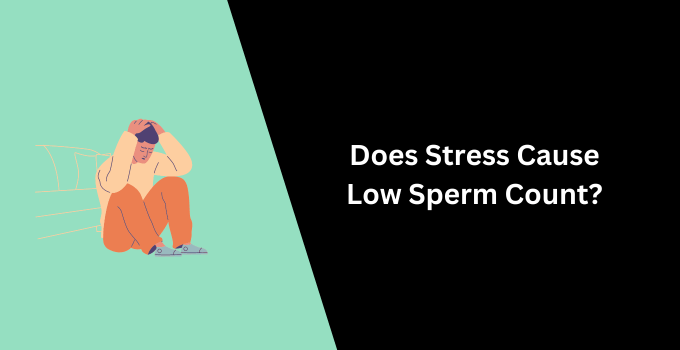Yes, stress can affect your sperm count. Both physical stress, from intense exercise or extreme temperatures, and mental stress, from work or relationships, can disrupt sperm production. Chronic stress lowers testosterone levels, reducing sperm count and quality. Anxiety and prolonged stress can impair sperm motility and morphology, leading to misshapen or abnormal sperm.
Managing stress is essential for improving sperm health and fertility. Techniques like relaxation and maintaining a healthy lifestyle can reduce stress. If you’re interested in understanding more about how stress and other factors influence sperm quality, exploring further will provide valuable insights.
Quick Answer: Yes, stress can cause low sperm count. When men are stressed, it can affect their sperm production, leading to a decrease in sperm count.
Which Stress Affects Sperm Quality? Physical Stress vs Mental Stress?
Both physical and mental stress can harm sperm quality, but they do so in different ways. Physical stress from intense exercise or extreme temperatures disrupts the balance needed for sperm production, while mental stress from work or relationships triggers hormonal changes that interfere with sperm production.
Both physical stress, like heavy exercise, and mental stress, such as anxiety, can decrease sperm concentration, appearance, and motility. To enhance fertility, focus on managing stress through healthy habits.
Can Managing Stress Improve Sperm Health and Fertility?
Yes, by managing stress, you can improve sperm count and overall sperm health. Managing stress is important for improving sperm health and fertility, as both physical and mental stress can greatly impact sperm quality.
Incorporating relaxation techniques and adopting a healthy lifestyle can help reduce stress. Staying physically active and maintaining a balanced diet are key strategies. Chronic stress lowers testosterone levels, impacting sperm production and quality.
How Does Chronic Stress Impact Sperm Quality?
Chronic stress greatly impacts sperm quality by reducing sperm motility and altering their morphology.
High stress levels can lead to a decrease in sperm count, often linked to increased anxiety and physical tiredness.
Understanding these factors can help you recognize the importance of managing stress for better reproductive health.
Does Chronic Stress Affect Sperm Motility and Morphology?
Yes, exposure to chronic stress can greatly impair sperm motility and morphology, undermining sperm’s effectiveness in fertilization. Stress affects sperm by decreasing their ability to swim effectively towards an egg, known as sperm motility.
Additionally, chronic stress can lead to changes in sperm morphology, resulting in a higher percentage of misshapen or abnormal sperm. These alterations reduce overall sperm quality and make fertilization more challenging.
Can High Stress Levels Reduce Sperm Count?
Yes, high stress levels can have a significant impact on male fertility. Not only does stress affect sperm motility and morphology, but it can also reduce sperm count. This is because stress can lead to lower testosterone production, which is crucial for sperm production. Occupational stress, especially, can worsen these effects, resulting in notable deficits in sperm quality.
Research indicates that men under high stress often have lower semen volume and a decreased percentage of progressive spermatozoa, directly affecting fertility. Prolonged stress, such as that experienced by soldiers in active duty, can further diminish sperm count and overall sperm health. It is crucial to manage stress effectively to maintain optimal reproductive health and increase the likelihood of conception.
Is There a Link Between Anxiety and Low Sperm Count?
Yes, anxiety and prolonged stress can greatly influence sperm quality and decrease sperm count. When you’re under constant stress, your body produces more cortisol, which can lower testosterone levels. This hormone imbalance negatively affects sperm production and overall fertility. Anxiety can also disrupt your daily routines, leading to unhealthy lifestyle choices like poor diet and lack of exercise, further exacerbating the issue.
Studies have shown that chronic stress, such as what soldiers experience on active duty, correlates with lower sperm quality and reduced semen volume. Managing stress through techniques like mindfulness or therapy might help improve your sperm count and fertility outcomes. So, addressing anxiety and stress is essential for maintaining optimal reproductive health.
Does Physical Tiredness Affect Sperm Quality?
Yes, physical tiredness, often a byproduct of chronic stress, can further diminish sperm quality. Physical stress and fatigue can disrupt hormone levels and semen parameters, making it harder for you to conceive. Studies show that men experiencing high levels of stress tend to have lower semen quality.
Incorporating healthy lifestyle factors like regular exercise, balanced diet, and adequate sleep can alleviate stress and improve sperm health. By managing stress, you can positively impact your fertility outcomes.
It’s essential to recognize the role of physical tiredness and stress in your overall reproductive health and take steps to mitigate their effects.
What Are the Ways to Reducing Stress and Improving Male Fertility?
Decreasing stress and embracing healthier lifestyle choices can greatly enhance male fertility and boost sperm count.
To improve sperm count and reduce stress, incorporate regular physical activity into your routine. Exercise helps manage stress and combat oxidative stress, which can negatively affect sperm quality.
Additionally, a healthy diet rich in fruits and vegetables provides essential nutrients that support overall health and sperm production. Limiting alcohol intake and quitting smoking are vital steps, as these habits can harm sperm quality.
Maintaining a healthy BMI through balanced nutrition and regular exercise also plays a significant role.
Affiliate Disclosure: Some of the links in this post are affiliate links, which means I may earn a small commission if you make a purchase through those links. This comes at no extra cost to you. Thank you for your support!



